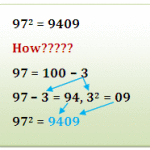ALGEBRA:
1. Sum of first n natural numbers = n(n+1)/2
2. Sum of the squares of first n natural numbers = n(n+1)(2n+1)/6
3. Sum of the cubes of first n natural numbers = [n(n+1)/2]^2
4. Sum of first n natural odd numbers = n^2
5. Average = (Sum of items)/Number of items
Arithmetic Progression (A.P.):
An A.P. is of the form a, a+d, a+2d, a+3d…
Where a is called the ‘first term’ and d is called the ‘common difference’
1. nth term of an A.P. tn = a + (n-1)d
2. Sum of the first n terms of an A.P. Sn = n/2[2a+(n-1)d] or Sn = n/2(first
term + last term)
Geometrical Progression (G.P.):
A G.P. is of the form a, ar, ar2, ar3…
Where a is called the ‘first term’ and r is called the ‘common ratio’.
1. nth term of a G.P. tn = arn-1
2. Sum of the first n terms in a G.P. Sn = a|1-rn|/|1-r|
Tests of Divisibility:
1. A number is divisible by 2 if it is an even number.
2. A number is divisible by 3 if the sum of the digits is divisible by 3.
3. A number is divisible by 4 if the number formed by the last two digits is
divisible by 4.
4. A number is divisible by 5 if the unit digit is either 5 or 0.
5. A number is divisible by 6 if the number is divisible by both 2 and 3.
6. A number is divisible by 8 if the number formed by the last three digits is
divisible by 8.
7. A number is divisible by 9 if the sum of the digits is divisible by 9.
8. A number is divisible by 10 if the unit digit is 0.
9. A number is divisible by 11 if the difference of the sum of its digits at odd
places and the sum of its digits at even places, is divisible by 11.






